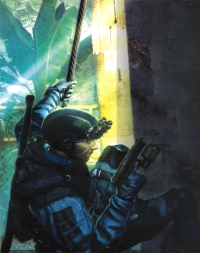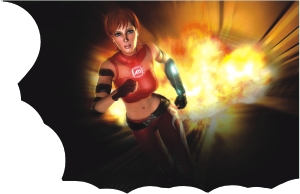
Harold Crick - Will Ferrell
Ana Pascal - Maggie Gyllenhaal
Jules Hilbert - Dustin Hoffman
Penny Escher - Queen Latifah
Karen Eiffel - Emma Thompson
 When screenwriter Zach Helm was a young man--younger, anyway; he's now 31--he gravitated to the impishly articulate works of Tom Stoppard, as so many young writers do. In particular he fell for the early Stoppard play "Rosencrantz and Guildenstern Are Dead," in which a couple of minor characters from Shakespeare's "Hamlet" mull their roles in someone else's tragedy, which unfolds at the whim of an unseen but all-powerful writer.
When screenwriter Zach Helm was a young man--younger, anyway; he's now 31--he gravitated to the impishly articulate works of Tom Stoppard, as so many young writers do. In particular he fell for the early Stoppard play "Rosencrantz and Guildenstern Are Dead," in which a couple of minor characters from Shakespeare's "Hamlet" mull their roles in someone else's tragedy, which unfolds at the whim of an unseen but all-powerful writer.
With "Stranger Than Fiction" Helm offers a breezy variation on Stoppard's conundrum. A toothsome slice of mainstream eccentricity, the film is easy-access existentialism with a happy ending. It deserves an audience, if only because it proves how handily Will Ferrell can handle a fairly radical key change in terms of comedy.
 The best scenes in director Marc Forster's picture are those between Ferrell, playing a fellow who hears a strange voice narrating in his head, and Dustin Hoffman, portraying a literature professor who appears to exist on a diet of coffee and tight-lipped inquiry. Ferrell's Harold Crick lives a deeply routinized existence as an Internal Revenue Service auditor. One day he realizes that the female voice in his head commenting on his workaday habits is actually a novelist, narrating Crick's life story. Crick is a character in a book being written by reclusive author Karen Eiffel (Emma Thompson).
The best scenes in director Marc Forster's picture are those between Ferrell, playing a fellow who hears a strange voice narrating in his head, and Dustin Hoffman, portraying a literature professor who appears to exist on a diet of coffee and tight-lipped inquiry. Ferrell's Harold Crick lives a deeply routinized existence as an Internal Revenue Service auditor. One day he realizes that the female voice in his head commenting on his workaday habits is actually a novelist, narrating Crick's life story. Crick is a character in a book being written by reclusive author Karen Eiffel (Emma Thompson).
Shadowed by a publisher-appointed adviser (Queen Latifah), Eiffel cannot find a fulfilling way to eliminate Crick. The auditor, who is smitten with the kind-hearted baker (Maggie Gyllenhaal) whose tax returns he is studying, gleans advice from the professor (Hoffman) about how to avoid death by literary execution. Crick needs to know: Is he in a tragedy or a comedy? Can he alter his own literary fate?
In his plum supporting role Hoffman makes the most of his scenes while expending the least amount of sweat. This is Zen muttering at its highest plateau, beyond effortless and very droll. The same is true of Ferrell's performance, which is consciously restrained in ways it takes a while to get used to. The movie may be a bit arch and doesn't have a lot of breathing room. But when Ferrell and Hoffman begin to hash out the Ferrell character's predicament, "Stranger Than Fiction" hits its stride and the result is a battle of the deadpan all-stars.
Screenwriter Helm, who has a sharp, precise way with banter, owes a considerable debt to the dual-reality-plane excursions of Charlie Kaufman ("Adaptation," "Being John Malkovich"). Shot in Chicago, "Stranger Than Fiction" stakes out a narrative realm not unlike Kaufman's rueful comic love stories, but this one's lighter and sweeter and, in the end, satisfying. Forster, who previously directed "Finding Neverland" and "Monster's Ball," manages to get everyone on the same earnest wavelength. While Forster errs in one key visual strategy--Crick's obsession with routine and numbers comes with an array of fancy visual aids, too fancy for my taste--he plays against cuteness. The whole of "Stranger Than Fiction" constitutes a high-wire act, brought off with elan.
Live your life to the fullest, the movie says. Nothing new there, but it's a nice reminder. The film's choicest lesson, though, relates to making brittle comic fantasy work on-screen. The lesson is this: The deader the deadpan the better. When Ferrell and Hoffman do their thing together, a charming bit of whimsy becomes something more. It becomes really, really funny.

Minimum System Requirements
System: 3000 MHz Pentium IV or AMD Athlon or equivalent
RAM: 1024 MB
Video Memory: 128 MB
Hard Drive Space: 7000 MB
 Fans of the Rainbow Six games for the PC have had every reason of late to be bitter. There will be a tendency by PC fans to want to ignore Rainbow Six Vegas, which would be a mistake. Yes, Rainbow Six Vegas is essentially a direct port of an Xbox 360 game, but Ubisoft has done an incredible job of reinvigorating Rainbow Six.
Fans of the Rainbow Six games for the PC have had every reason of late to be bitter. There will be a tendency by PC fans to want to ignore Rainbow Six Vegas, which would be a mistake. Yes, Rainbow Six Vegas is essentially a direct port of an Xbox 360 game, but Ubisoft has done an incredible job of reinvigorating Rainbow Six.
First, the PC version is almost exactly the same as the Xbox 360 version. Thus, the single-player campaign is exactly the same, and the multiplayer features almost all the functionality of the Xbox 360 version.
In the campaign, you play as Logan Keller, the leader of one of Rainbow's elite three-man counterterrorist assault teams who is called into action after an operation in Mexico goes bad and, for some reason, the terrorists strike the casinos and high-rise hotels of Las Vegas. Your job is to stop them and ascertain their intentions, which involves the standard McGuffin device that will kill millions and a secret military base hidden inside a massive hydroelectric dam.
In Rainbow Six Vegas, slabs of concrete are your best friend, along with the edges of doorways, slot machines, the sides of SUVs, and pretty much anything else solid that you can put between yourself and the enemy. The controls translate fairly elegantly to the PC's mouse and keyboard.
You don't fight alone in Rainbow Six Vegas, either; you're usually accompanied by your two teammates. The artificial intelligence does a great job of controlling these agents as they follow you. Tapping on the Alt key tells them to either hold place or fall in behind you. In fact, the controls for the game in general are pretty intuitive and simple.
What also promotes Rainbow Six Vegas over its predecessors is the sensation that you're really playing as an elite commando. In a page or two borrowed from Splinter Cell's Sam Fisher, you can play in a highly mobile and agile manner. You can quickly rope out of a helicopter onto the top floor of a skyscraper, run over to the side, and leap over the edge on a rappel line, all in a few seconds. While on the rappel line you can hang upside down, lower yourself far enough to see into the target room, then call out the location of the terrorists inside. Then, on your command, your team will burst through the window and clear the room. On the normal difficulty level, Rainbow Six Vegas is a moderately challenging game, though it's fairly forgiving thanks to the fact that you can absorb a fair amount of damage before you die. Rainbow Six Vegas uses a regenerating health system, so there are no health packs or health meters to worry about. Instead, when you take damage your vision begins to blur, and if you take too much damage you die.
However, if you ratchet up the difficulty setting to "realistic," Rainbow Six Vegas becomes an incredibly tense and difficult experience--in a good way.
Speaking of dying, the game uses a checkpoint save system, so when you do die, you'll get a chance to start back at the latest checkpoint. Longtime PC shooter fans will likely cry out for a quick save option, but at least the checkpoints are reasonably spaced, and there's usually one before ever major set-piece battle, which is helpful.
The single-player campaign can be played cooperatively, both in story mode and in terrorist hunt, which pits you and your buddies against a bunch of randomly placed terrorists. You can also play with up to four players cooperatively, which is an interesting number since the single-player campaign features only three Rainbow agents at a time.
In addition to co-op, Rainbow Six Vegas features a number of fun competitive modes with support for up to 16 players. Retrieval is a particularly good one, modeling itself after the typical capture the flag-style game and featuring respawns so you don't have to sit out if you get killed. There are a number of modes that feature no respawns, if you want the "authentic" Rainbow Six experience of no second chances. The levels themselves are adapted either from the single-player campaign or created specifically for multiplayer, such as a university library that's alluded to in the story.
Rainbow Six Vegas sports some excellent graphics, and the PC version looks just as good as the Xbox 360 version--it's even slightly better in some places. The downside is your frame rate will vary depending on your hardware, and you'll obviously need a fairly powerful system to run it at high detail with fast frame rates. Those with older and slower systems should think about upgrading or simply playing the Xbox 360 version. The amount of detail on everything is impressive.
While Rainbow Six Vegas bears little resemblance to its illustrious PC progenitor, that's no reason to write off this engrossing action game. Rainbow Six Vegas is a highly tactical and dynamic first-person action game that fans of realistic shooters should definitely check out.

 Someone once said that the processing powers of the computers will double every one and a half year. Well that is true no more! 2006 has been a year of great computing, as the technology has changed and improved beyond any imagination, breaking theoretical barriers by miles in just one year. We will take a dive into the world of computronics and find out how and why our friendly little machine sitting on our desktop has gained in status over in the last 12 months.
Someone once said that the processing powers of the computers will double every one and a half year. Well that is true no more! 2006 has been a year of great computing, as the technology has changed and improved beyond any imagination, breaking theoretical barriers by miles in just one year. We will take a dive into the world of computronics and find out how and why our friendly little machine sitting on our desktop has gained in status over in the last 12 months.
Out with Pentium in with Core
Finally Intel has dumped its much debated Pentium line of processors and outshined itself with the all new state of the art microchip family named Core 2, based on the dual core architecture which packs two or four cores inside a single CPU. Instead of going heavily into techno mumbo jumbo such as architecture, die size, transistors or FSB, lets just say that Intel's latest Core 2 Duo line of processors are at the moment the fastest desktop processors that the world has ever seen. Even six months ago, AMD would have been called the absolute king of the processor market with its fully functional 64 bit Windows Vista ready processors, and even punching not one but two 64bit cores in one (AMD Athlon 64 X2), and beating out Intel's Pentium D series of power hungry low performing dual core processors. Intel had to do something really amazing and so it did. Using similar technology as Pentium D, but with lesser die size and a combined cache of upto 4 megs intel came out with the Core 2 Duo, promising to deliver 40% more performance and 40% less power consumption. Now beat that AMD.
AGP vs. PCI Express SLI.
Around last year, our motherboards started to come without any AGP slots but with PCI Express slots. What PCI Express is basically a PCI slot just like the ones we use for our soundcard or LAN Card kinda thing, except it has two way data transfer mode and giving higher data transfer rate than the AGP card. But early this year, NVIDIA, the market leader for making AGP cards or PCI Express cards came out with a brand new concept of teaming up not one but two AGP cards in tandem to produce the ultimate gaming experience. This dual powered PCI E is called an SLI card for Geforce or Crossfire card for Radeon cards. And now towards the end of the year, even that is going to be changed forever.
Usually graphics cards used to handle the graphics portion of the games and the other parts such as the physics and collision, Artificial Intelligence etc, befell on the CPU, which meant that whether or not you had the ultimate graphics card, you still ahd to buy yourself the ultimate CPU in order to get the most out of your games. But not anymore. The buzz is now, the market leaders Nvidia and ATI are working on a type of card that not only creates stunning onscreen visual but also calculates the physics and the AI of your games. If you just imagine yourself playing a FPS on a huge battleground with hundreds of opponent soldiers and thousand more stuff to blowout with your grenade, this is where this little baby will rock when it comes out. These are not just AGP or PCI Express cards, these are pure gaming cards.
IPOD vs. Zune
Who has not heard of an IPOD? Nobody! Who has heard of Microsoft ZUNE? Well, almost nobody as well. Well Microsoft in its attempt to take over the online music retailing business has come out with Zune player, which is Microsoft's answer to IPOD. Well a ZUNE does almost the same thing as an IPOD does, it plays Music, but then why would ANYBODY want to buy a ZUNE player? Lets see the what's it got to outdo the Apple Player in comparison.
Well Zune will have Wi-Fi, which means that you can take it any wireless hotspot and connect to the web instantly and download your favourite music. You can also share your tunes with your friends via Wi Fi, however, your borrowed tunes will be deleted after you listen to it 3 times. What a pity. Microsoft has also said that Zune will connect with XBOX 360 and with Windows Media Player for digital Song Management. Also it will boast a built in radio tuner picture viewer and will have a 3 inch display monitor, tad bigger that the IPOD's two and a half inch. The users of Zune, however will not have access to Apple's ITune online music store, but will be able to access only online Microsoft Music network. While IPOD comes in several versions of hard disk size, Zune will come only in 3 different colours but will have the same Hard Disk capability of 20 Gigs. Similarly priced at 250 Dollars.
Now, we bangalis NEVER EVER buy music, we only download it. Also, given the price of such gadgets, those who have rather large purses and think that have the style to match are the only ones who goes out to buy a price IPOD. So if you think like me, I would rather stick to my cheap mp3 players which are available and if you take a little care, they last you quite a long time. Mine is still going strong after one and a half years.
So that's it folks, from the resident techie guy in RS. I hope you are fast able to keep up with the latest in shifting computer technology. Or get you'll end up being left so far behind that, you might as well run towards the stone age, as that will be closer to you.
